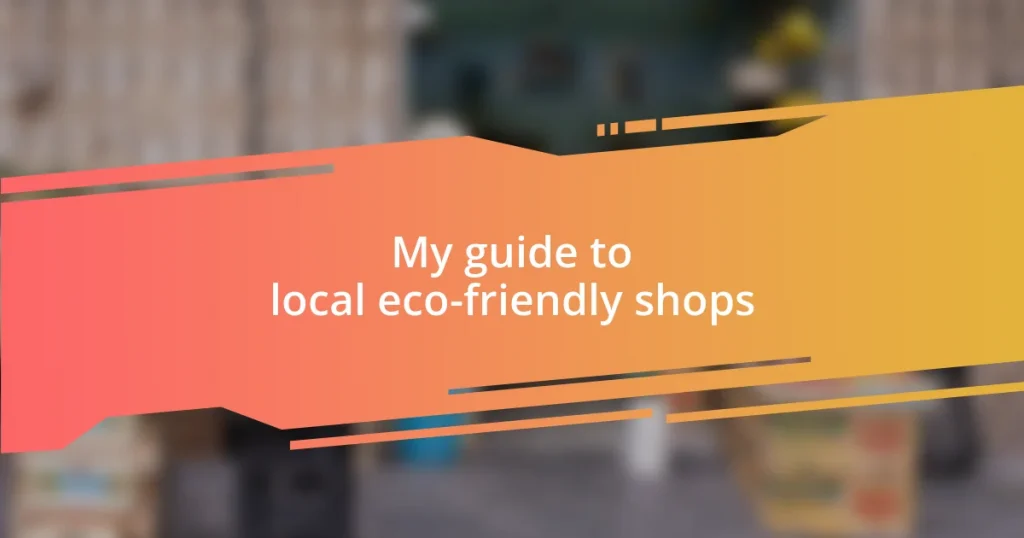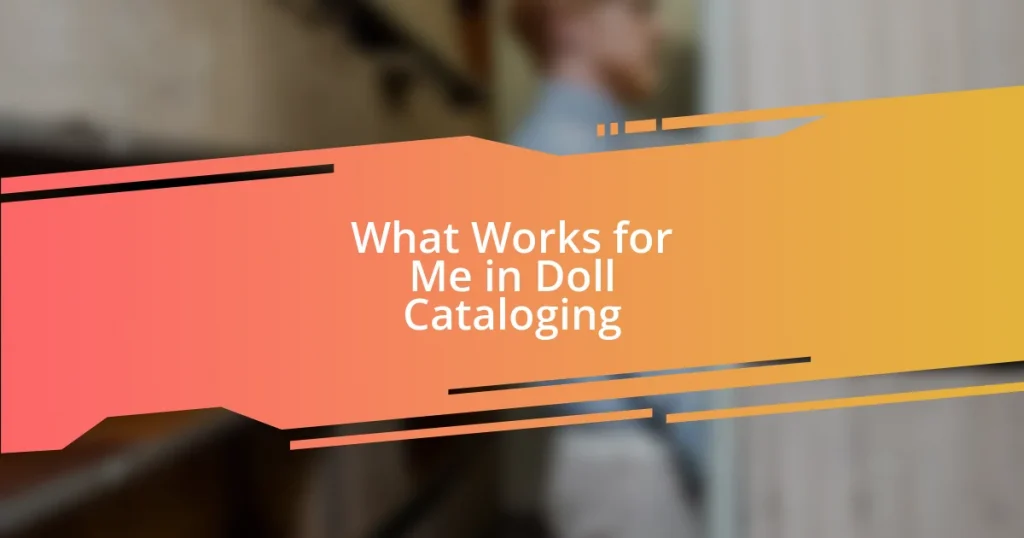Key takeaways:
- Eco-friendly shopping is a holistic lifestyle choice focused on the product lifecycle, ethical sourcing, and personal values.
- Local eco-friendly shops support communities by reducing carbon footprints, promoting unique products, and fostering connections with consumers.
- Engaging with local businesses and spreading awareness enhances community bonds and aligns purchasing decisions with personal values for greater impact.
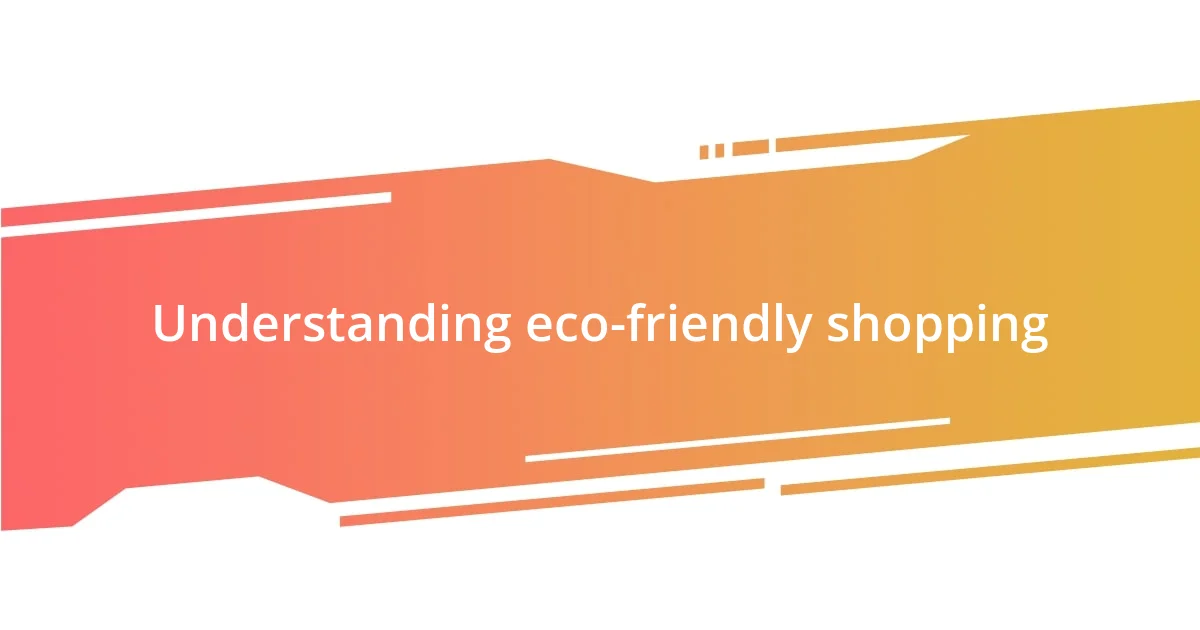
Understanding eco-friendly shopping
Eco-friendly shopping goes beyond just picking products labeled as “green.” It’s about being conscious of the entire lifecycle of a product, from how it’s made to its impact on the planet after use. I remember feeling truly empowered the first time I chose to support a local shop that emphasized sustainable practices. The moment I walked in, seeing handcrafted goods made from recycled materials sparked a sense of connection to the earth and the creators behind those products.
Have you ever felt a twinge of guilt while shopping? I know I have. The pressure of consumerism can be overwhelming, and sometimes it feels like every choice contributes to a larger environmental issue. But understanding eco-friendly shopping gives you control over your decisions. It encourages you to ask questions: Where do these products come from? Who made them? Supporting eco-friendly shops often means supporting small businesses that prioritize ethical sourcing and fair labor, which can be incredibly rewarding on many levels.
In my journey, I’ve discovered that eco-friendly shopping isn’t just about making a purchase; it’s a lifestyle choice. Every time I opt for reusable bags or choose products with minimal packaging, I feel a small thrill of satisfaction, knowing I’m making a positive impact. Isn’t it heartening to think that our daily choices can drive change? Adopting this mindset has transformed my shopping experience into an adventurous quest for sustainability, making each trip feel meaningful and reflective of my values.
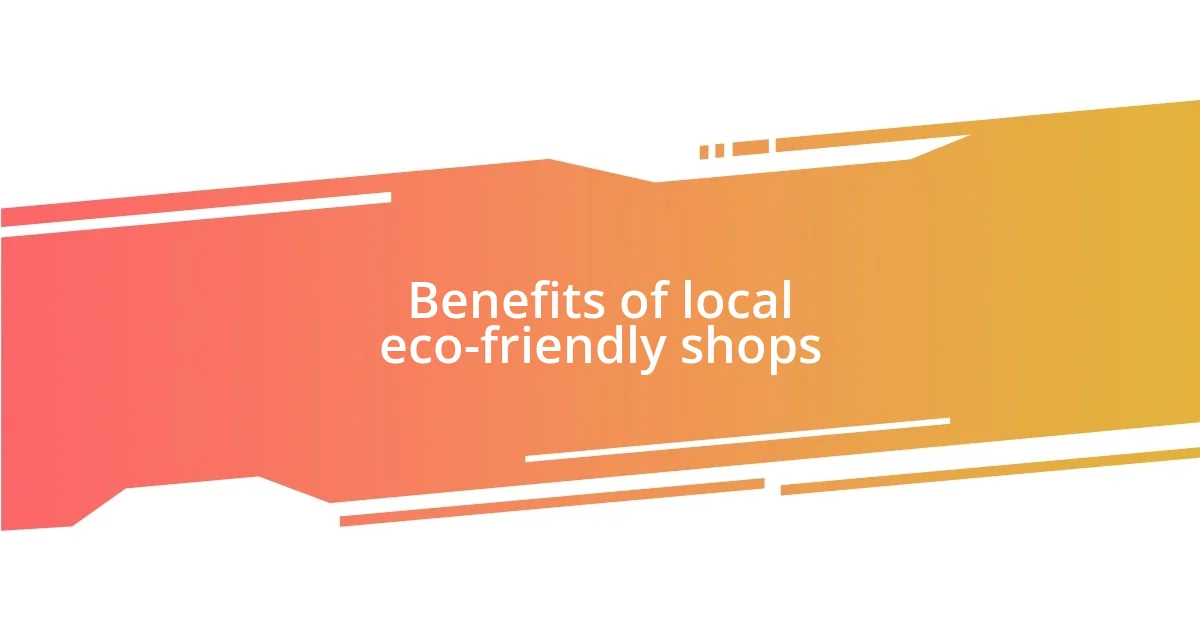
Benefits of local eco-friendly shops
Local eco-friendly shops bring a multitude of benefits that resonate with both consumers and the communities they serve. I often appreciate the sense of community that grows around these shops. When I step into a local store, I’m not just a customer; I’m part of a collective effort to foster sustainable practices. The staff usually has in-depth knowledge about the products, sharing stories about their sourcing and the artisans behind them. It’s refreshing to engage in conversations that deepen my understanding of sustainability.
Here’s a quick rundown of the key benefits:
– Support for Local Economies: Shopping local helps keep money within the community, empowering small businesses.
– Reduced Carbon Footprint: With shorter supply chains, local products often mean less transportation, leading to lower emissions.
– Unique Offerings: Many eco-friendly shops feature one-of-a-kind items that you won’t find in large retail stores, adding a personal touch to my purchases.
– Ethical Practices: Local shops often prioritize fair trade and sustainable sourcing, so I can feel good about my choices.
– Connection to Nature: I find it inspires me to learn more about sustainable practices, making it easier to incorporate eco-friendly habits into my daily life.
These aspects create not just a shopping experience, but a lifestyle rooted in community involvement and environmental responsibility. Each purchase I make feels rewarding, knowing I’m contributing to something bigger.
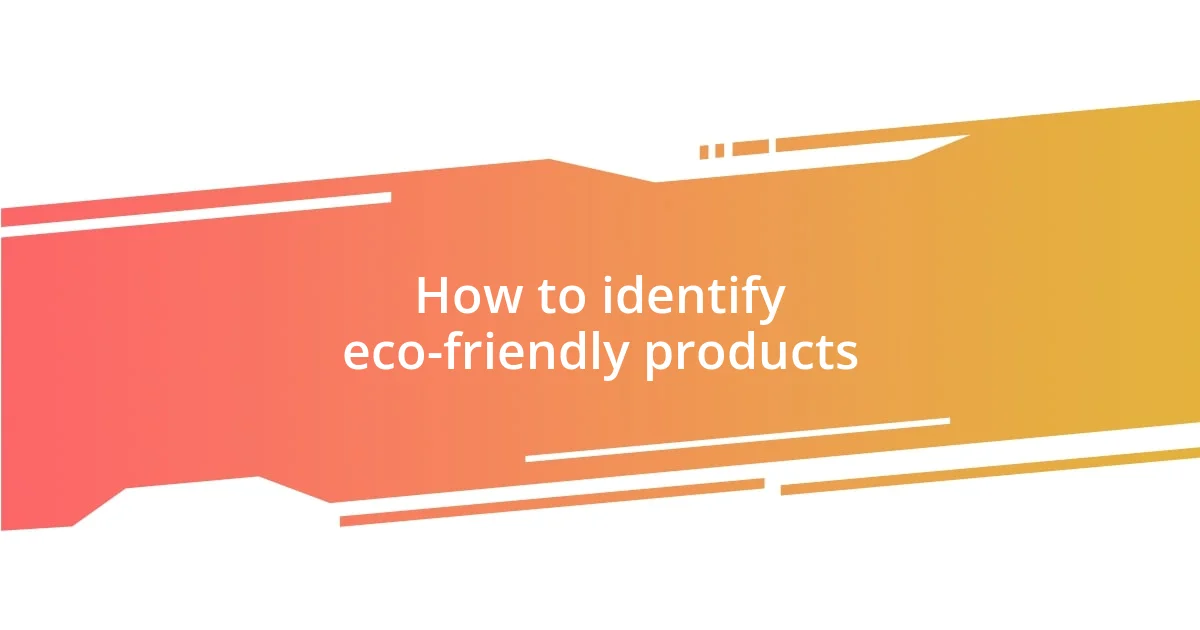
How to identify eco-friendly products
Identifying eco-friendly products requires a keen eye and some essential knowledge. When I first began to navigate this landscape, I found it helpful to check labels for certifications such as USDA Organic, Fair Trade, or Energy Star. These labels often signal that a product has met specific environmental or ethical standards. It can be exhilarating to sift through a shelf and find items that reflect my values, yet I’ve learned that not all labels are created equal.
In my experience, I often look for full transparency in marketing. For instance, companies that openly share their sourcing practices and ingredient lists tend to be more trustworthy. A memorable moment for me was discovering a skincare brand that went beyond marketing jargon. They not only provided a detailed breakdown of ingredients, but also shared their environmental impact assessment online. It felt good to invest in a product knowing exactly what I was getting into—both for my skin and the planet.
To make it easier, I’ve created this brief comparison table that breaks down key features to look for in eco-friendly products versus their conventional counterparts.
| Eco-Friendly Products | Conventional Products |
|---|---|
| Sourced sustainably | Often sourced with little regard for environmental impact |
| Minimal to no harmful chemicals | May contain synthetic chemicals and toxins |
| Biodegradable or recyclable packaging | Usually non-biodegradable plastics |
| Fair labor practices | Labor practices often not disclosed |
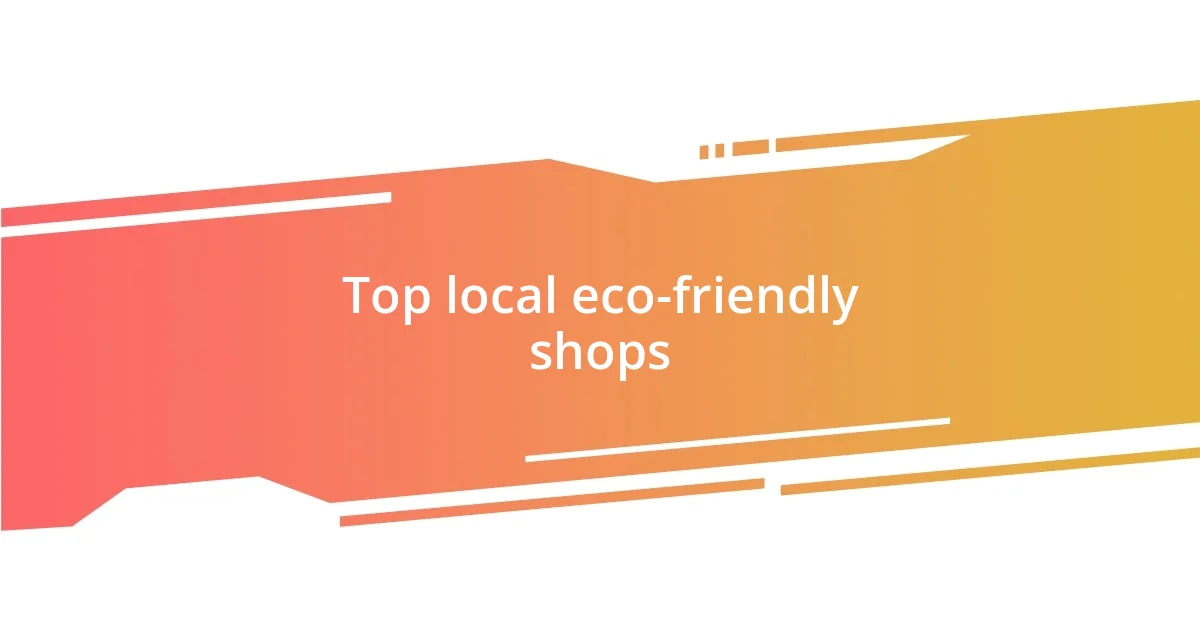
Top local eco-friendly shops
Strolling through my favorite neighborhoods, I’ve stumbled upon some fantastic local eco-friendly shops that never cease to amaze me. One gem, a quaint little store called Green Haven, specializes in zero-waste products, from reusable produce bags to bamboo utensils. Each time I visit, I can’t help but feel a sense of pride as I support a business that not only curates its selection mindfully but also runs workshops on sustainable living.
Another remarkable spot is Earthly Treasures, where I once found handcrafted candles made from soy wax and essential oils. The owner’s passion for sourcing materials locally was infectious. They took time to explain how each scent was inspired by the nearby forest. Has anyone else experienced that wonderful moment when a product resonates with your values? It’s like finding a piece of home.
Beyond just shopping, I look for stores like The Eco Emporium, which often host community events, from DIY workshops to talks by local environmentalists. Participating in these gatherings has helped me connect with like-minded individuals who share my commitment to sustainability. It reminds me that each purchase isn’t just a transaction; it’s part of a larger conversation about our responsibility to the planet.
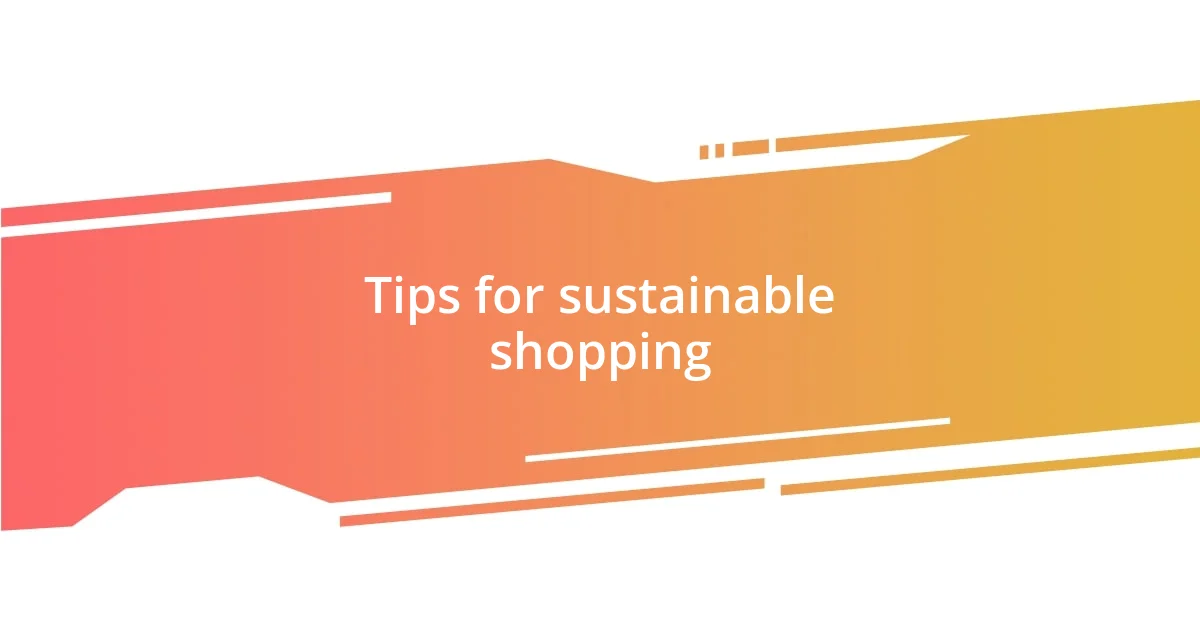
Tips for sustainable shopping
When I’m out shopping sustainably, I try to make a conscious effort to prioritize quality over quantity. It’s tempting to buy several items that seem eco-friendly, but I’ve learned that investing in a few well-made products can be much more impactful. For example, I once splurged on a beautifully crafted reusable water bottle, and it has not only replaced countless single-use plastics but has also become a conversation starter wherever I go—who knew sustainability could provide an avenue for connection?
Another tip I’ve found useful is to engage with local shop owners. They often have amazing stories and insights about the products they’re selling. During one of my visits to a farmer’s market, I struck up a conversation with a vendor who shared the journey of their organic produce from farm to table. As I listened, I couldn’t help but feel a deeper appreciation for their commitment to sustainable farming. Have you ever noticed how personal connections can make your purchases feel more meaningful? It turns the act of shopping into a shared experience, reinforcing my commitment to supporting ethical businesses.
Lastly, I always carry a reusable tote bag. It helps me avoid those pesky plastic bags and serves as a reminder of my sustainable shopping ethos. During one shopping trip, I forgot my bag and had to accept plastic instead. That moment was a wake-up call—it made me realize the importance of preparation in helping to reduce waste. So, consider this: how can small habits, like bringing your own bag, transform your shopping experience? I believe they can help us stay mindful of the choices we make every day.
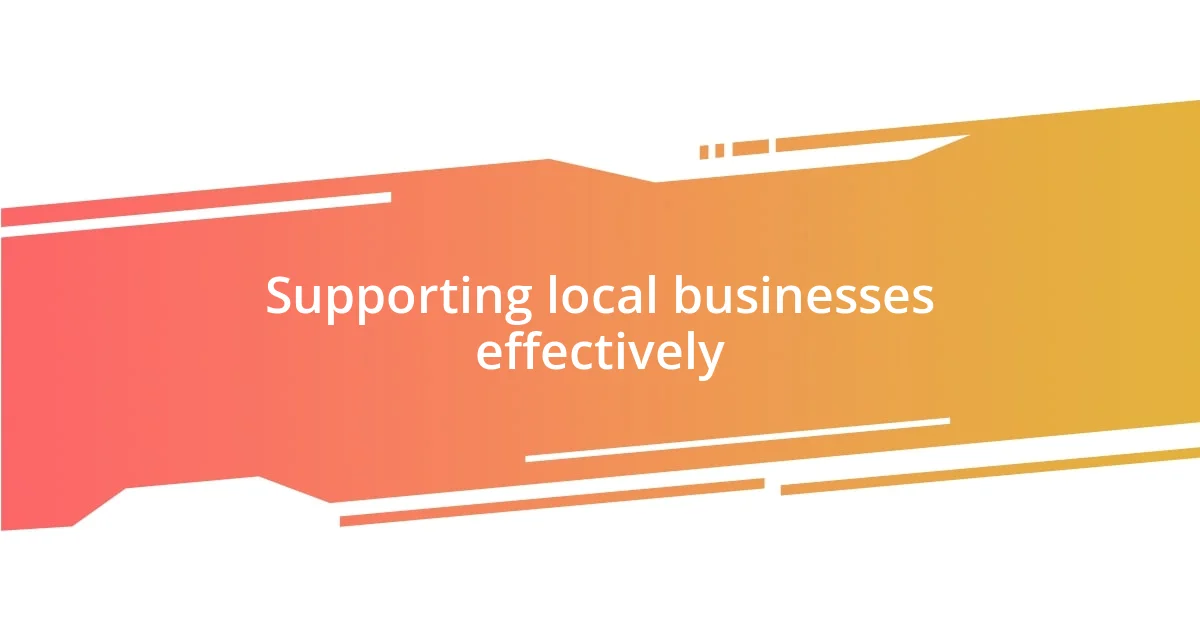
Supporting local businesses effectively
Supporting local businesses goes beyond simply making a purchase; it’s about fostering a sense of community. I remember a rainy Saturday when I ducked into a tiny bookstore that doubled as a local art gallery. I spent hours there, chatting with the owner about her passion for promoting local artists. It struck me how vital it is to create spaces where we can connect with each other and celebrate our community’s creativity. Have you ever found that hidden gem that makes you feel right at home? That’s the magic we cultivate when we support local shops.
To truly support local businesses effectively, I believe it’s essential to spread the word. After discovering a new artisan bakery in my neighborhood, I couldn’t resist sharing my experience on social media. Not only did my friends appreciate the recommendation, but I also felt a wave of joy knowing I might help someone else find their new favorite spot. Isn’t it rewarding to know that your enthusiasm can encourage others to explore and support local entrepreneurs? Each share is like a ripple in a pond, expanding the positive impact we have.
Another crucial element is to actively seek out businesses that align with our values. For instance, I once learned about a local shop that donates a portion of its profits to environmental causes. By choosing to buy there, I wasn’t just purchasing a product; I was contributing to a mission that resonated deeply with me. Have you ever considered how your dollars can support broader initiatives? When we align our spending with our values, we turn consumerism into a powerful tool for change.
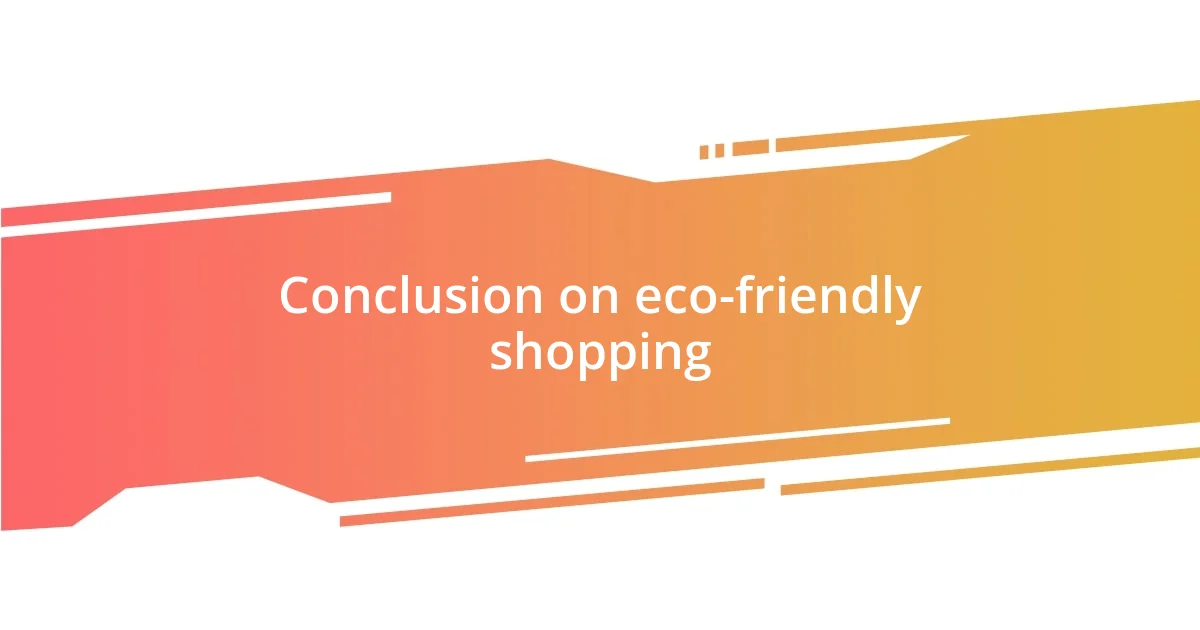
Conclusion on eco-friendly shopping
Shopping eco-friendly isn’t just a trend—it’s a lifestyle choice that carries significant weight. I once stood in line at a local green grocery store, surrounded by people who shared my passion for sustainability. There was a sense of camaraderie among us as we exchanged small talk about our favorite sustainable brands. It made me realize how shopping can unite us in a common goal, transforming what could be a mundane task into a fulfilling experience. Don’t you agree that when we shop consciously, we’re not just buying products; we’re buying into a shared vision of a healthier planet?
When I reflect on my eco-friendly shopping journey, it’s not just about the items I choose to buy; it’s about the lifestyle I embrace. During my quest to reduce plastic use, I stumbled upon a delightful zero-waste shop in my city. Inside, I found a vast array of bulk goods that encouraged me to bring my own containers. I left that day not just with groceries, but with new habits that felt empowering. Have you ever had one of those lightbulb moments where you realize small changes make a big difference? It’s those moments that illuminate the path toward sustainable living.
Ultimately, eco-friendly shopping is an ongoing journey—not a destination. My approach has evolved with every purchase, conversation, and experience. I recall a particularly eye-opening discussion I had with a friend about ethical fashion; it challenged my views and led to deeper insight into my buying choices. This ongoing evolution reminds me that we all have room to grow. Isn’t that a beautiful aspect of being a conscious consumer? The more we learn and adapt, the stronger our collective impact becomes.










